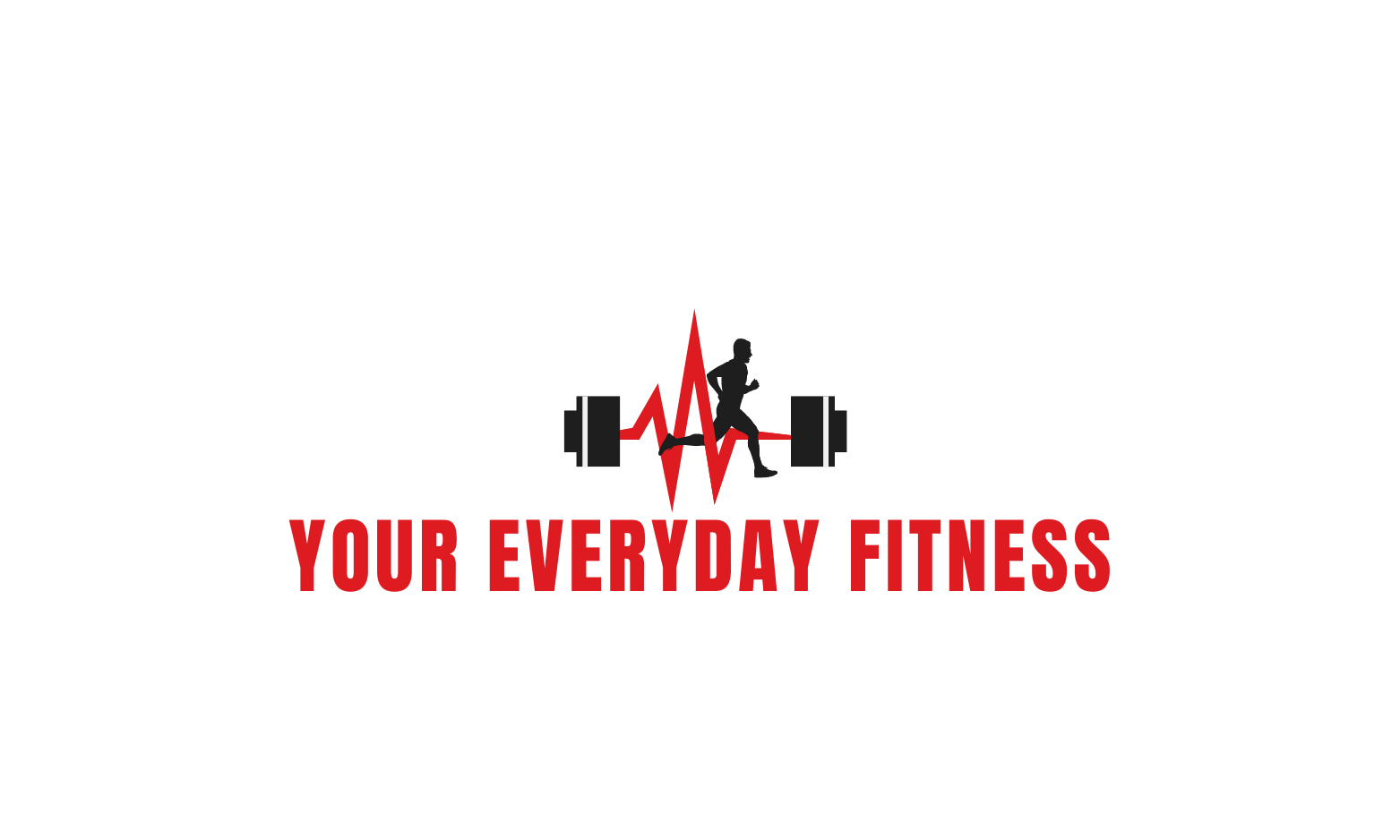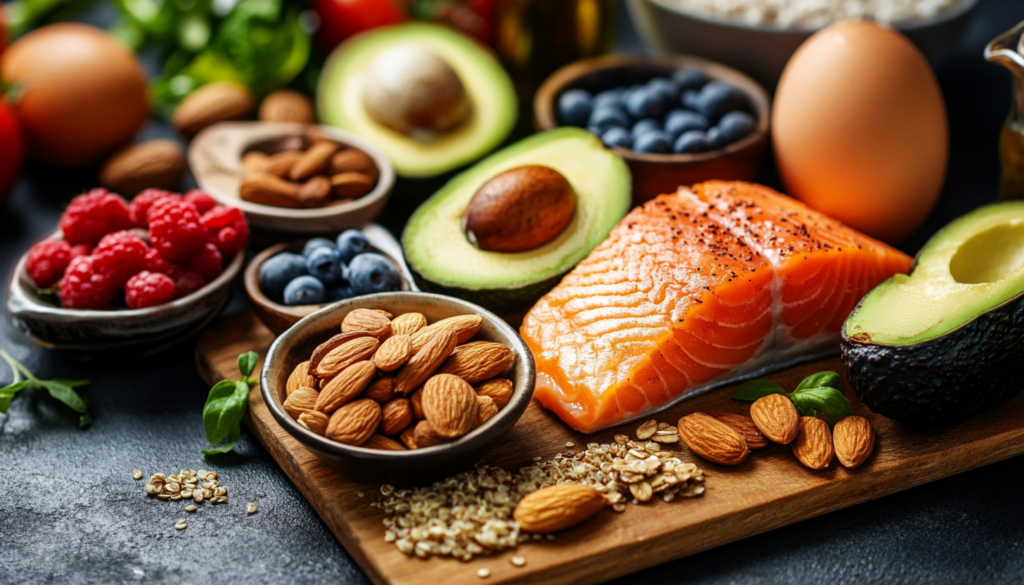Strength training isn’t just about lifting weights; it’s about feeding your muscles the right stuff to grow and perform. Think of your body as a high-performance machine that needs the right fuel to run smoothly. Let’s break down how to get the most out of your workouts with smart nutrition.
Why Nutrition Matters for Strength Gains
You can’t build a house without bricks, and you can’t build muscles without proper nutrition. The food you eat gives your muscles the energy and nutrients they need to grow and recover. Skimp on nutrition, and you’re shortchanging your gains.
A balanced diet with the right mix of protein, carbs, and fats is your ticket to muscle growth, better workouts, and quicker recovery. Each of these nutrients has a job to do, so let’s see how they work together.
The Big Three: Protein, Carbs, and Fats
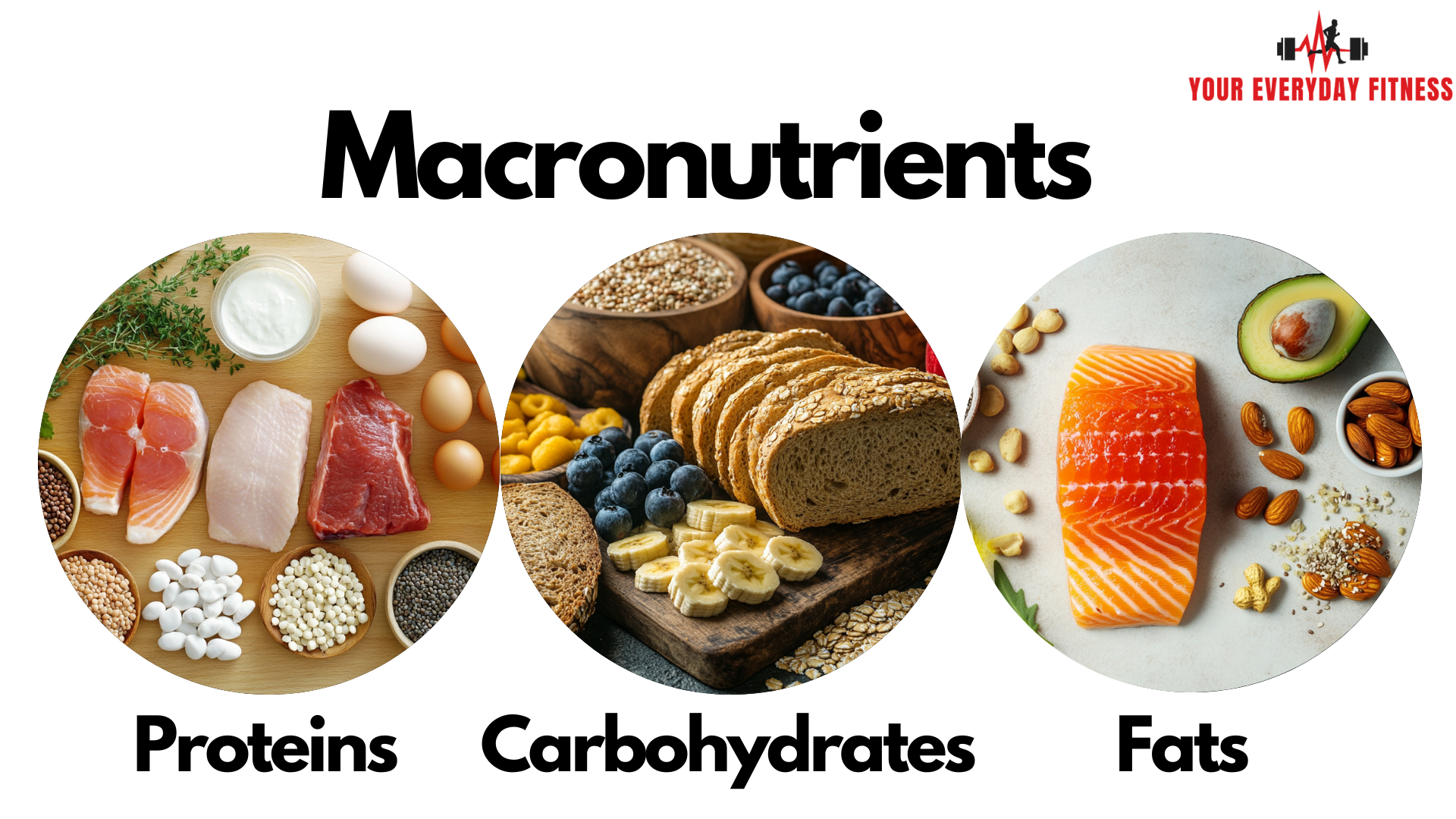
To get the most out of your strength training, you need to know what each macronutrient does.
Protein: Muscle Builder
Protein is the MVP when it comes to muscle growth and repair. When you lift weights, you create tiny tears in your muscles. Protein helps patch those up, making your muscles bigger and stronger. Aim for about 0.7-1 gram of protein per pound of body weight daily. This can vary based on how active you are and your goals. For more on protein, check out our article on protein for muscle growth.
Carbs: Energy Powerhouse
Carbs are your muscles’ main energy source during workouts. They give you the fuel to power through those tough sets and help replenish your energy stores afterward. Aim for 2-4 grams of carbs per pound of body weight each day, depending on your activity level and goals. For more on carbs, see our article on carbohydrates and strength performance.
Fats: The Unsung Hero
Fats often get a bad rap, but they’re crucial for overall health and strength training. They help with hormone production, nutrient absorption, and keeping inflammation in check. Include healthy fats like avocados, nuts, seeds, and olive oil in your diet. Aim for fats to make up about 20-30% of your daily calories. For more on fats, check out our article on recommended fat intake for strength training.
Putting It All Together
Understanding how protein, carbs, and fats work can help you optimize your strength training. By eating the right balance of these nutrients, you’ll give your body what it needs to build muscle, perform better, and recover faster. So next time you hit the gym, remember: it’s not just about lifting weights; it’s about fueling your body right.
Protein: The Muscle Fuel
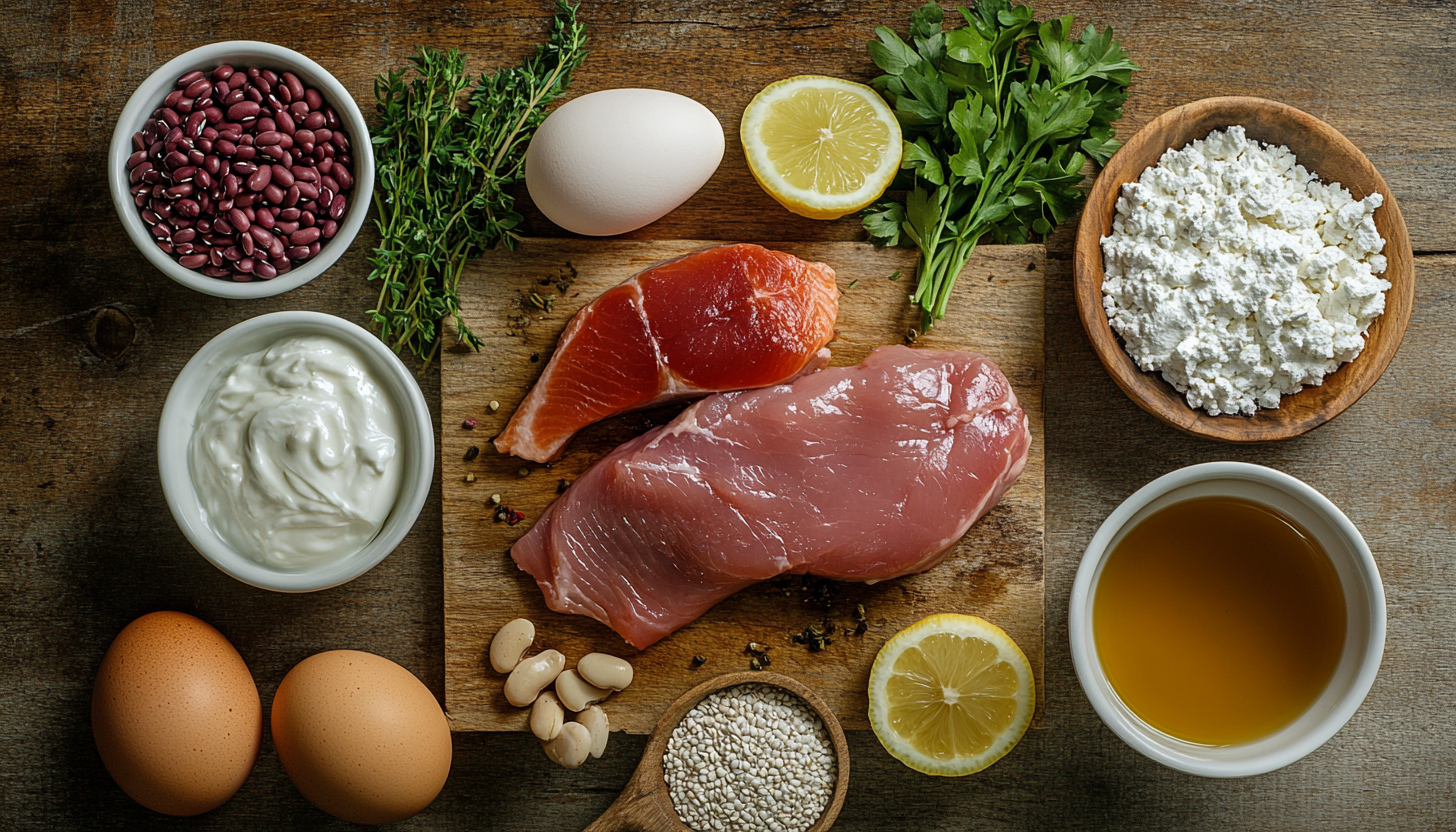
Strength training without protein is like a car without gas—it just won’t go far. Protein is the magic ingredient that helps your muscles grow and repair. It’s the stuff that makes your muscles bigger and stronger after a tough workout. Let’s break down why protein is so important and how much you really need to get those gains.
Why Protein Matters for Muscle Growth
When you hit the gym and lift weights, your muscles get tiny tears. Sounds bad, but it’s actually good! These microtears are what make your muscles grow. Protein comes in to fix these tears, making your muscles stronger and bigger. Think of protein as the handyman that repairs and builds your muscle house.
In a large meta-analysis, protein intake was shown to promote additional gains in lean body mass beyond those observed with resistance exercise alone (Stokes et al., 2018).
But protein isn’t just for muscle repair. It also keeps your immune system in check and gives you the energy to crush your workouts. So, if you want to get the most out of your strength training, you gotta get your protein game on point.
It is important to note that distributing protein intake evenly across meals (20–30 g of protein per meal) enhances muscle protein synthesis more effectively than consuming your protein predominantly in one meal.(Carbone & Pasiakos, 2019).
For more on how protein helps your muscles, check out our article on protein for muscle growth.
How Much Protein Do You Need?

How much protein should you eat? It depends on your weight, how hard you train, and your goals.
Studies have shown that to prevent a protein deficiency, you need to consume around 0.4 grams of protein per lb of bodyweight each day. That being said, if you are training often, and looking to put on muscle and get stronger, you’ll need more.
It has been shown that between 0.7-1.1 grams of protein per lb of bodyweight will be optimal for adding muscle mass and strength (Carbone & Pasiakos, 2019).
The most important protein you will consume is right after working out. Ingesting 20–30 g of protein post-exercise significantly enhances fat-free mass, strength (as measured by one-repetition maximum), and muscle hypertrophy (based on myofiber cross-sectional area). So make sure to get some protein in your gut after you lift.
Here’s how to figure it out your protein intake:
Take your weight in pounds and multiply it by a number between 0.7 and 1.1. So, if you weigh 170 lbs and you’re aiming for 0.9 grams of protein per lb, you’d need 153 grams of protein a day (170 lbs x 0.9 g/lb = 153 g).
To hit your protein goals, fill your plate with protein-packed foods like chicken, fish, eggs, dairy, beans, tofu, and maybe even a protein shake. Spread your protein intake throughout the day—don’t just load up at dinner. For more tips on getting enough protein, read our article on strength training macronutrients.
Getting enough protein, along with a solid workout plan, will help you build muscle and get stronger. Listen to your body and tweak your protein intake based on how you feel and what you want to achieve.
Healthy Options:
- Chicken breast
- Greek yogurt
- Eggs
- Tofu
- Lean ground beef
Carbs: Your Workout Fuel
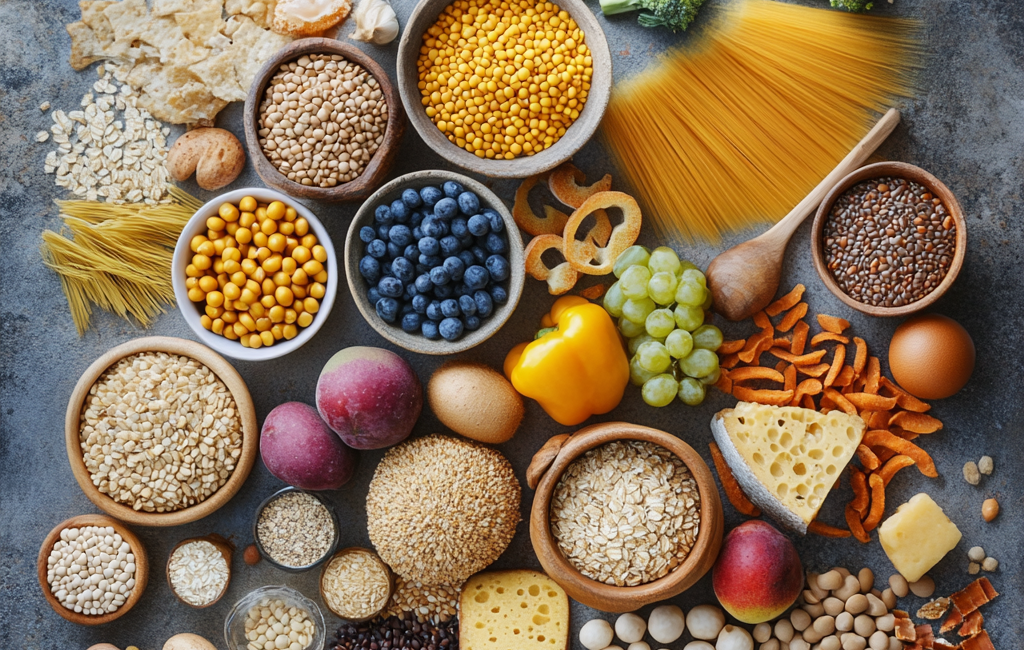
When you’re hitting the gym for some serious strength training, carbs are your best friend. They give you the energy to power through those tough sets and reps. Let’s break down why carbs are so important for your workouts and how much you should be eating to get the most out of your training.
Why Carbs Matter in Strength Training
Carbohydrates are seen as the primary macronutrient for high-intensity performance, providing rapid energy when needed most. They are like the gas in your car—they keep you moving.
This is because carbs are converted into glucose and stored as glycogen in muscles and the liver, providing a readily available energy source that fuels high-intensity exercise, delays fatigue, and optimizes endurance by maintaining blood sugar levels and replenishing muscle glycogen stores during and after physical activity.
When you’re lifting weights or doing resistance exercises, your muscles need quick energy, and carbs deliver just that. Eating enough carbs before you work out can help you lift heavier and do more reps.
Diets low in carbohydrates may reduce exercise intensity, hinder performance improvements, and increase the risk of muscle damage, particularly during intense training (Kanter, 2017).
After your workout is when carbs refill your muscle’s glycogen. This is crucial for recovery and getting ready for your next session.
How Much Carbs Should You Eat?

How many carbs you need depends on your weight, how hard you train, and your goals.
According to the Food and Drug Administration (FDA), around 275 grams of carbs per 2,000 calories is a good rule of thumb. That being said, it depends on your training regimen.
Athletes can require as much as 3.5–5.5 grams of carbohydrates per pound of body weight per day, especially those training for long durations, to maintain muscle glycogen stores (Kanter, 2017).
Consuming 0.25–0.30 grams of carbohydrates per pound of body weight immediately after exercise can significantly enhance glycogen replenishment, vital for recovery and subsequent performance (Kanter, 2017).
What to Eat
Refined grains, potatoes, and sugary drinks are associated with increased risks for obesity, diabetes, cardiovascular disease, and some cancers, while whole fruits, veggies, legumes, and minimally processed grains are linked to reduced risks and are packed in vitamins, minerals, and fiber, which are all good for your overall health. (Ludwig, Hu, Tappy, & Brand-Miller, 2020).
The quality of carbohydrates, such as whether they are processed or unprocessed, plays a more significant role in chronic disease risk than the overall amount of carbohydrates consumed, so make sure to get high quality carbs (Ludwig, Hu, Tappy, & Brand-Miller, 2020).
Healthy Options:
- Quinoa
- Sweet potatoes
- Oats
- Brown rice
- Lentils
Don’t forget to balance your diet with enough protein and fat. A well-rounded diet helps you stay healthy and strong. For more tips on what to eat for strength training, check out our article on strength training macronutrients.
Bottom Line
Make carbs a priority in your diet to fuel your workouts and help you recover. With the right nutrition, you’ll be able to push harder and see better results in the gym.
Fats: Your Secret Weapon
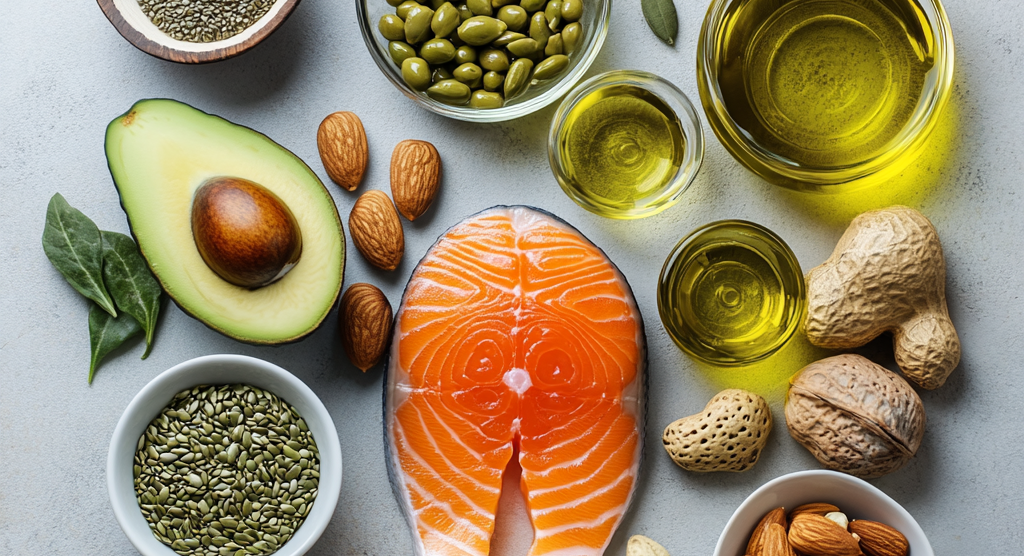
When you’re pumping iron, fats are the unsung heroes that keep you going strong. While protein and carbs often steal the show, fats deserve a standing ovation in your strength training macronutrients game plan.
Why Fats Matter in Strength and Recovery
Fats are like the slow-burning logs on your workout fire. They provide a steady stream of energy, keeping you fueled during those grueling sessions. Athletes on high-fat diets show a significant increase in time to exhaustion at set exercise levels, meaning they can perform for longer durations before fatigue sets in (Lundsgaard, Fritzen, & Kiens, 2020).
They’re also essential for hormone production, which is crucial for muscle growth, repair, and recovery.
After you exercise, your body continues to burn fats for energy for several hours. This helps you recover by saving the sugar stored in your muscles (called glycogen) for later use, instead of using it up right after your workout (Lundsgaard, Fritzen, & Kiens, 2020).
Healthy fats also help your body absorb vital nutrients. Vitamins A, D, E, and K need fats to be absorbed properly, and these vitamins are key players in your overall health and performance. And let’s not forget, fats make your meals taste better and keep you feeling full, so you’re less likely to raid the fridge at midnight.
How Much Fat Do You Need?

When figuring out how much fat to eat, focus on the good stuff. Think avocados, nuts, seeds, and fatty fish. These foods are packed with unsaturated fats, which are the kind you want.
Foods high in polyunsaturated and monounsaturated fats, like nuts and avocados, provide significant health benefits, reducing cardiovascular risk and promoting overall health. Trans fats should be completely avoided (Liu et al., 2017).
The American Heart Association suggests that fats should make up about 20-35% of your daily calories. But everyone’s different. Your age, gender, body type, and training goals all play a role in determining your ideal fat intake. A registered dietitian or nutritionist can help you nail down the perfect amount for you.
Remember, fats are calorie-dense. They pack 9 calories per gram, compared to 4 calories per gram for protein and carbs. So, watch your portions to avoid overdoing it. Balancing your fat intake with protein and carbs is key to hitting your strength goals.
Adding healthy fats to your diet is easy. Toss some nuts or seeds into your meals, cook with olive oil, or enjoy fatty fish a couple of times a week. To keep track of your fat intake, use a food diary or a mobile app.
Healthy Options:
- Avocados: Rich in heart-healthy monounsaturated fats.
- Nuts (like almonds, walnuts, and cashews): High in both healthy fats and protein.
- Seeds (such as chia, flax, and pumpkin seeds): Packed with omega-3 fatty acids and fiber.
- Fatty fish (like salmon, mackerel, and sardines): A great source of omega-3 fatty acids, which promote heart health.
- Olive oil: Full of monounsaturated fats and antioxidants, great for cooking or dressings.
By giving fats the attention they deserve, you can fine-tune your nutrition plan and power up your strength training. Prioritize healthy fats and work with a pro to get your macronutrient balance just right.
Nailing Your Macro Game for Strength Training
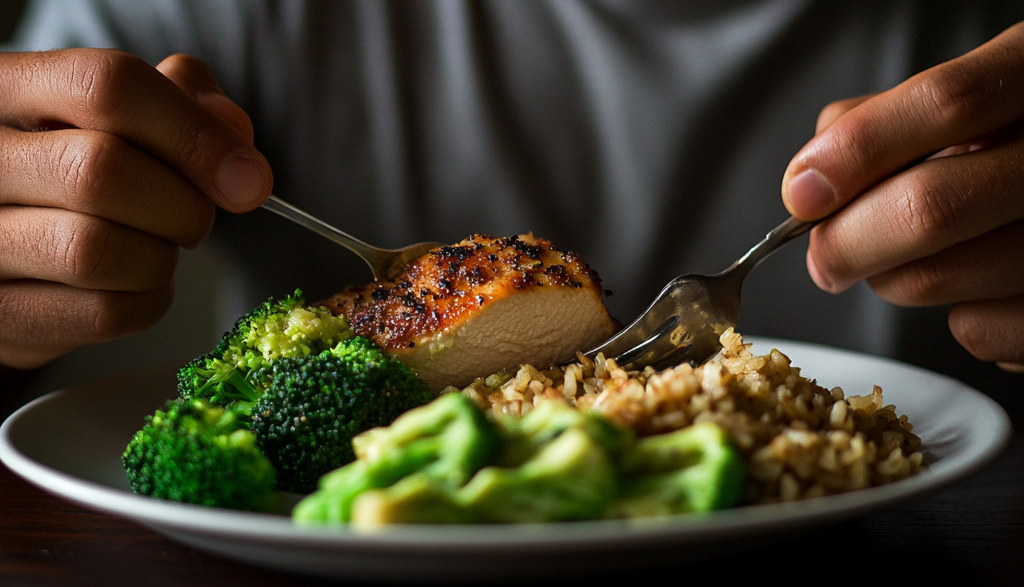
Want to crush your strength training goals? It all starts with getting your macro balance right. We’re talking about the right mix of protein, carbs, and fats in your diet. Finding that sweet spot can power your workouts and help you build muscle like a pro.
Figuring Out Your Macros
First things first, you need to figure out how much of each macronutrient you need. Here’s a simple way to break it down:
- Protein: This is your muscle-building buddy. Aim for 0.7 to 1 gram of protein per pound of body weight. So, if you weigh 150 pounds, shoot for 105 to 150 grams of protein a day. Easy peasy.
- Carbs: These are your energy boosters. You want 45 to 65 percent of your daily calories to come from carbs. This keeps you fueled up for those intense workouts.
- Fats: Don’t skimp on fats—they’re crucial for hormone production and overall health. Aim for 20 to 35 percent of your daily calories from fats. Think avocados, nuts, seeds, and olive oil.
Everyone’s different, so you might need to tweak these numbers based on your body, activity level, and goals. Chatting with a dietitian or nutritionist can give you a more personalized plan.
Tweaking Macros for Your Goals
Your macro needs can change depending on what you’re aiming for. Here’s how to adjust:
- Building Muscle: Want to bulk up? You’ll need more calories. Increase your protein and keep a good balance of carbs and fats. This helps you pack on muscle without gaining too much fat.
- Losing Fat: Trying to shed some pounds but keep your muscle? Create a small calorie deficit by cutting back on carbs and fats, but keep your protein intake high to preserve muscle.
- Boosting Performance: If you’re all about performance, load up on carbs to keep your energy levels high. Make sure you’re still getting enough protein for muscle repair and growth.
Consistency is key. Stick to your plan, listen to your body, and adjust as needed. Your progress will tell you if you’re on the right track.
For more tips and a deeper dive into how each macronutrient supports your strength goals, check out our article on strength training macronutrients.
Putting It Into Practice

Alright, now that we’ve got the lowdown on macronutrients for strength training, let’s get practical. Here’s a sample meal plan to keep you on track and some handy tips to nail that macro balance.
Sample Meal Plan for Strength Training
| Meal | Macronutrient Breakdown |
|---|---|
| Breakfast | 2 scrambled eggs (protein and fats), 1 slice of whole wheat toast (carbs), 1 cup of mixed berries (carbs and fiber) |
| Snack | Greek yogurt with almonds and blueberries (protein, fats, and carbs) |
| Lunch | Grilled chicken breast (protein), quinoa (carbs), and roasted veggies (fiber and carbs) |
| Snack | Apple slices with peanut butter (protein, fats, and carbs) |
| Dinner | Baked salmon (protein and fats), sweet potato (carbs), and steamed broccoli (fiber and carbs) |
| Pre-Bedtime Snack | Cottage cheese with sliced almonds and a drizzle of honey (protein, fats, and carbs) |
This plan keeps your protein, carbs, and fats in check all day to support your strength goals. Adjust portions and ratios to fit your needs and tastes.
Tips for Keeping Your Macros in Check
- Track Your Macros: Use a food diary or app to keep tabs on your daily intake. This helps make sure you’re hitting your protein, carb, and fat targets.
- Prioritize Protein: Make sure every meal and snack includes protein. It’s crucial for muscle growth and repair. For more on protein’s role in muscle growth, check out our article on protein for muscle growth.
- Choose Complex Carbs: Go for whole grains, fruits, and veggies as your main carb sources. They offer sustained energy and essential nutrients. Learn more about carbs in strength workouts in our article on carbs and strength performance.
- Include Healthy Fats: Add nuts, seeds, avocado, and olive oil to your meals. These fats support hormone production and help with nutrient absorption. Discover more about fats in strength and recovery in our article on fats in strength and recovery.
- Stay Hydrated: Drink plenty of water throughout the day, especially around your workouts. For more hydration tips, refer to our article on hydration for strength athletes.
- Consider Nutrient Timing: Pay attention to when you eat. Having protein and carbs before and after workouts can boost muscle protein synthesis and recovery. Learn more about nutrient timing in our article on nutrient timing for strength gains.
Finding the right macro balance might take some tweaking. Listen to your body and adjust as needed. If you have dietary restrictions or follow a specific diet like veganism, adapt the meal plan accordingly. Check out our article on vegan strength training nutrition for more info.
By sticking to a balanced meal plan and keeping your macros in check, you’ll fuel your body for strength training and maximize your gains. Don’t hesitate to consult a registered dietitian or nutritionist for personalized advice based on your needs and goals.
Sources
- Liu AG, Ford NA, Hu FB, Zelman KM, Mozaffarian D, Kris-Etherton PM. A healthy approach to dietary fats: understanding the science and taking action to reduce consumer confusion. Nutr J. 2017 Aug 30;16(1):53. doi: 10.1186/s12937-017-0271-4. PMID: 28854932; PMCID: PMC5577766.
- Pendergast DR, Horvath PJ, Leddy JJ, Venkatraman JT. The role of dietary fat on performance, metabolism, and health. Am J Sports Med. 1996;24(6 Suppl):S53-8. PMID: 8947430.
- Lundsgaard AM, Fritzen AM, Kiens B. The Importance of Fatty Acids as Nutrients during Post-Exercise Recovery. Nutrients. 2020 Jan 21;12(2):280. doi: 10.3390/nu12020280. PMID: 31973165; PMCID: PMC7070550.
- Ludwig DS, Hu FB, Tappy L, Brand-Miller J. Dietary carbohydrates: role of quality and quantity in chronic disease. BMJ. 2018 Jun 13;361:k2340. doi: 10.1136/bmj.k2340. PMID: 29898880; PMCID: PMC5996878.
- Kanter M. High-Quality Carbohydrates and Physical Performance: Expert Panel Report. Nutr Today. 2018 Jan;53(1):35-39. doi: 10.1097/NT.0000000000000238. Epub 2017 Oct 21. PMID: 29449746; PMCID: PMC5794245.
- Ribeiro AS, Quintilhano K, Kassiano W, Nunes JP, Avelar A, Trindade MCC, Aguiar AF, Schoenfeld BJ, Cyrino ES. The Effects of Carbohydrate Intake on Body Composition and Muscular Strength in Trained Men Undergoing a Progressive Resistance Training. Int J Exerc Sci. 2023 Feb 1;16(2):267-280. PMID: 37114196; PMCID: PMC10124722.
- Henselmans M, Bjørnsen T, Hedderman R, Vårvik FT. The Effect of Carbohydrate Intake on Strength and Resistance Training Performance: A Systematic Review. Nutrients. 2022 Feb 18;14(4):856. doi: 10.3390/nu14040856. PMID: 35215506; PMCID: PMC8878406.
- Stokes T, Hector AJ, Morton RW, McGlory C, Phillips SM. Recent Perspectives Regarding the Role of Dietary Protein for the Promotion of Muscle Hypertrophy with Resistance Exercise Training. Nutrients. 2018 Feb 7;10(2):180. doi: 10.3390/nu10020180. PMID: 29414855; PMCID: PMC5852756.
- Carbone JW, Pasiakos SM. Dietary Protein and Muscle Mass: Translating Science to Application and Health Benefit. Nutrients. 2019 May 22;11(5):1136. doi: 10.3390/nu11051136. PMID: 31121843; PMCID: PMC6566799.
